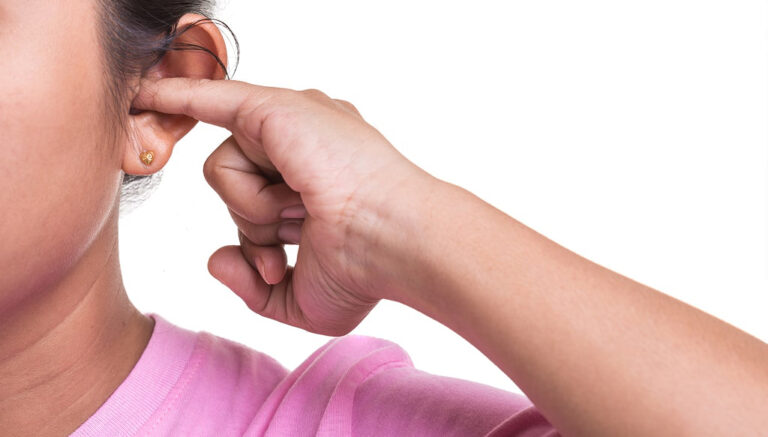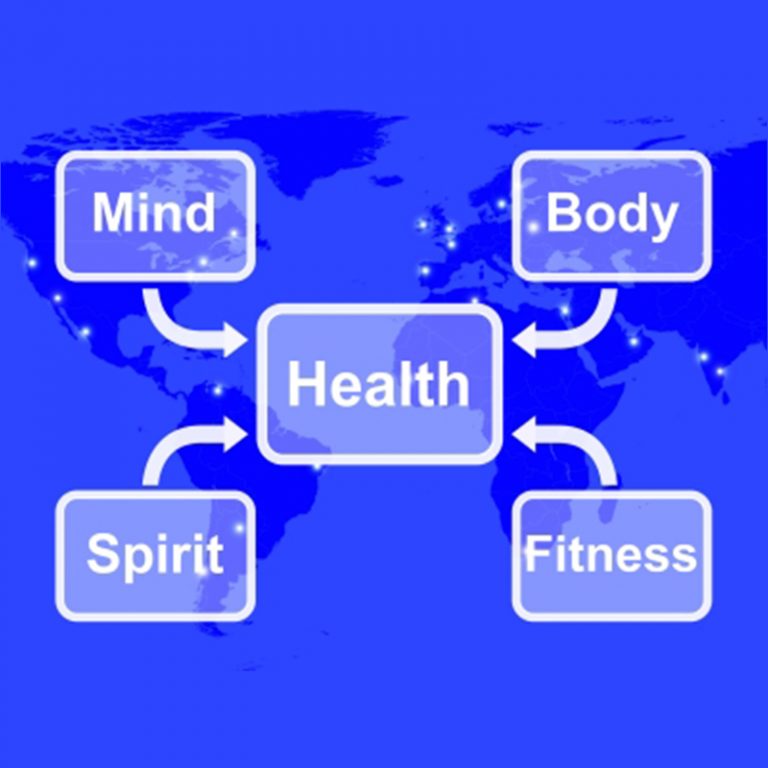Ayurvedic Treatment for Excessive Sweating | Hyperhidrosis Treatment
The Real Causes of Excessive Sweating and How Ayurveda Can Help
Sweating, also known as perspiration, is the body’s natural way of regulating its temperature. This is a normal response to intolerable heat, humidity, an intense workout, or a fever. But when sweating occurs in excess and for no apparent reason, it may be a signal that something is not quite right.
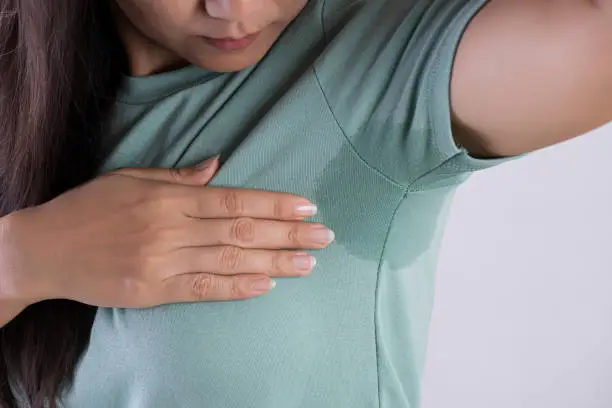
Some people sweat chronically and it is something that they are used to since childhood. Other people sweat only in certain parts of the body (such as hands or armpits), while others hardly sweat at all. Women experience “hot flashes” as they reach menopause, as do some men during the phase of andropause.
Each person is different…so when is it an indication of a real problem?
Sweating when there is little to no physical activity or in bearable temperatures is one of the most telling signs that something may be wrong. This is how your adrenals respond to exhaustion – but why is your system exhausted in the first place? And what could be the real cause behind excessive sweating?
The Causes of Excessive Perspiration
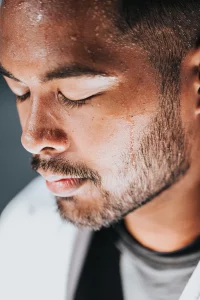
Excessive perspiration can be due to one or more of the following root causes:
- Climate (extremely hot or humid)
- Dehydration
- Digestive issues
- Excessive body fat (being overweight)
- Fever
- Intense fear
- Hypothyroidism or other thyroid disorders
- Hormonal imbalances
- Menopause / Andropause
- Nutritional deficiencies (particularly calcium deficiency)
- Oncoming heart attack
- Organic defects or diseases (liver, kidneys)
- Strenuous exercise
- Stress and/or anxiety
- Weakness
Occasionally, excessive perspiration has no known cause and is therefore considered a subclinical symptom. If you feel discomfort and uneasiness in your daily routine due to excessive sweating, you may seek hyperhidrosis treatment.
SYMPTOMS OF HYPERHIDROSIS
The only major hyperhidrosis symptom which occurs in the human body is excessive sweating. However, this seating causes disruptions in day-to-day life. It gets to a point when socialising and doing everyday activities becomes challenging. The sweating occurs in the palms, underarms, on face and feet. Individuals also experience heavy night sweats which causes disruptions in sleep patterns.
If you feel discomfort and uneasiness in your daily routine due to excessive sweating, you may seek hyperhidrosis treatment. Seek a doctor immediately, if excessive sweating is accompanied with dizziness, chest pain or feeling of nausea.
Ayurveda, an ancient healing system based on the body type concept, views excessive sweating as a symptom of an imbalanced Pitta dosha. Pitta represents the element of Fire, which makes complete sense, as sweating is the accumulation of intense heat or inflammation within the body – all the characteristics of the Pitta dosha.
But Ayurveda is more than just theory and concepts. The system offers various methods by which an affected dosha can be balanced and the body can effectively heal. The same applies to excessive perspiration and its root causes.
How Can Ayurveda Help Minimise Excessive Sweating?
Ayurveda is a drugless, side-effect-free, and all-natural route one can follow to minimise their perspiration episodes and tackle the root cause behind them.
If you seek treatment through Ayurveda, you will reap the multiple benefits this holistic science has to offer – from balancing your dosha to feeling rejuvenated and better overall in body, mind, and spirit.
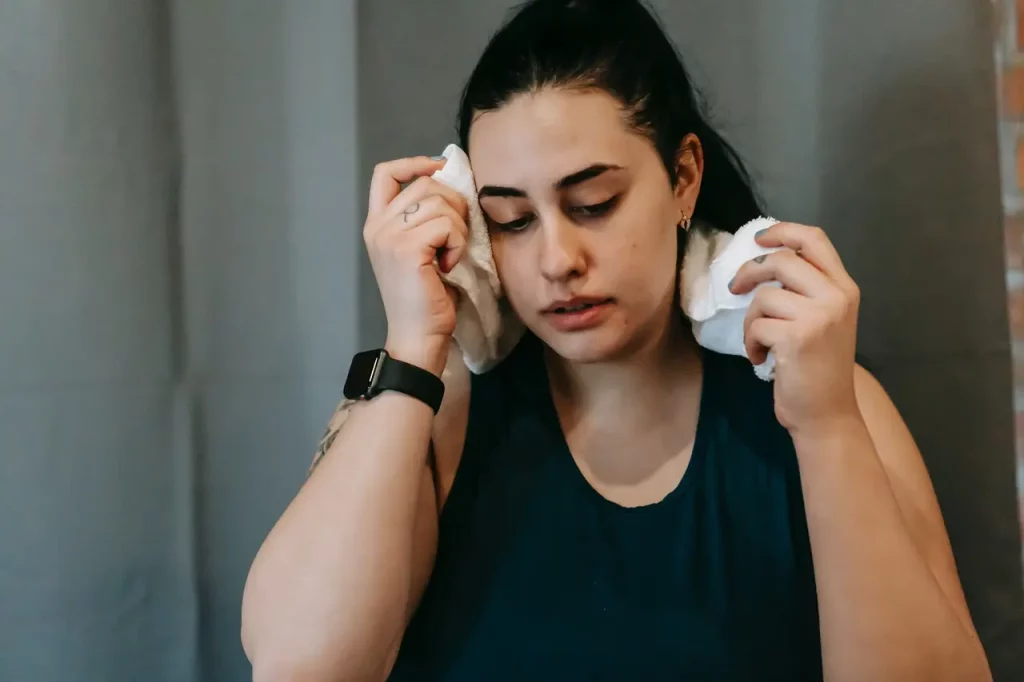
To begin the hyperhidrosis treatment, a qualified Ayurvedic practitioner will initially assess you based on your symptoms, body type, pulse, eyes, and overall energy. You will then be prescribed one or more of the following excessive perspiration treatment options:
- Ayurvedic Herbal Medicine
Ayurvedic herbal medicine is a customised, side-effect-free herbal decoction prepared for you by your Ayurvedic practitioner. This medicinal preparation will tackle the root cause of your excessive sweating while pacifying the Pitta dosha.
The most commonly used Ayurvedic herbs for excessive perspiration are Shilajit, Bringharaj, Arjuna, Amalaki, and Vidari but you should always consult an Ayurvedic practitioner for the safest and most suitable dosage options.
- Diet
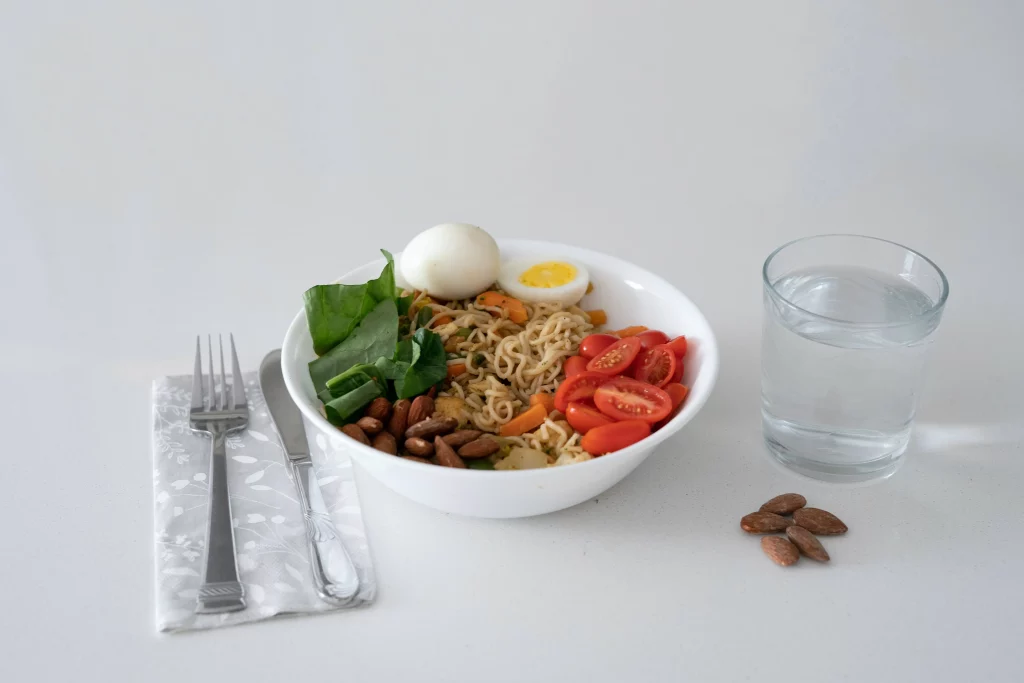
A customised dietary plan may be given to you in order to balance out your affected Pitta dosha (which will also tackle any digestive problems you may be dealing with) and up your nutritional intake (especially if you are nutrient deficient).
As calcium deficiency is one of the most common causes of excessive perspiration (particularly if you sweat on the hands and feet), you may be instructed to eat more calcium-rich foods, such as almonds, chickpeas, eggs, seafood, soybeans, kale, yoghurt, and others.
- Yoga
Yoga may be prescribed as a complementary form of therapy that can, in the case of excessive sweating, stimulate the bodily functions necessary for regulating body temperature while also addressing whatever root cause may be hindering these functions.
Forward Bends (both seated and standing) are highly recommended postures for those dealing with excessive perspiration. Yogic breathing techniques, such as Bhastrika, Sitali, and Nodi Shodhana pranayama, are highly efficient at soothing and cooling down the body.
Natural Remedies for Hyperhidrosis
Some of the natural remedies for Hyperhidrosis may include:
- Drink a cup of Black Tea or Green Tea
- Sage Tea may also help you with the condition of excessive sweating.
- You may apply some cool aloe vera gel on your face and underarms.
- Apply sandalwood paste which is known for its cooling properties. It may help control sweat production.
- You may cool yourself with an ice pack on your head or by simply rubbing an ice cube on your face.
- A little amount of diluted Tea Tree oil may also help in fighting the sweat causing bacteria.
Conclusion
Excessive perspiration may, in most cases, be due to a benign cause. However, you must not assume so without seeking proper medical advice, as it may be a symptom of something more serious.
At the Yatan Holistic Ayurvedic Centre in Sydney, we can assist you by tailoring your own customised excessive perspiration treatment plan, which is free of side effects and 100% natural.
Call us today at 1300 552 260 to receive a treatment for excessive sweating.
Frequently Asked Questions
What is excessive sweating a symptom of?
Excessive or unusual sweating can be a symptom of an underlying health condition such as hyperthyroidism, dehydration, excessive body fat, anxiety and fear, fever, infection, menopause, etc.
When should I be worried about sweating too much?
If excessive sweating wakes you up at night coupled with chest pain, palpitations, fever, weight loss, shortness of breath, or if it disrupts your daily life, then you should be concerned about your health. It’s better to seek an immediate medical checkup from a healthcare provider.
How do I stop excessive body sweating?
Managing excessive body sweating can be done by various methods like wearing breathable fabrics, practising good hygiene, and keeping yourself hydrated. You may also try the above mentioned natural remedies for excessive sweating in the article.
Does excessive sweating mean you are unhealthy?
Excessive sweating does not automatically imply that you are unhealthy. It can result from genetics, climate, medical conditions, or environmental factors. However, one should evaluate how often one sweats profusely. Based on that frequency, you should get yourself checked by a healthcare professional.
Which organ is responsible for sweating?
Our sweat glands in our skin are responsible for sweating. Our nervous system controls the release of sweat.
Does exercise reduce sweating?
Exercise can generally increase sweating as your body is naturally trying to cool itself down. However, regular exercise may make you more efficient at cooling yourself, thereby reducing the overproduction of sweat.
How can I stop excessive sweating in Ayurveda?
Ayurveda suggests dietary modification, lifestyle changes and incorporating herbal medicines to control excessive sweating. Sometimes treatment of an underlying condition like menopause or hyperthyroidism can also solve the problem of excessive sweating. Herbs like Shatavari and Aloe vera may be used for treatment of excessive sweating.
Which Ayurvedic medicine is best for sweating?
Ayurvedic medicine which is best for treating excessive sweating depends on your body’s personal constitution and overall health. It is best to consult with an Ayurvedic practitioner before starting consuming any ayurvedic medicine.
Can Ashwagandha help hyperhidrosis?
Ashwagandha may not directly help hyperhidrosis but as an adaptogenic herb, it may reduce stress, tension and anxiety which may cause excessive sweating. Consult with an Ayurvedic practitioner to learn more about the use of Ashwagandha.
What are natural remedies for excessive body sweating?
- Drinking Sage tea may reduce excessive sweating.
- Lifestyle Changes like managing stress, going for regular health check ups, wearing breathable fabrics and maintaining good hygiene.
- Applying Chandan (Sandalwood paste) may also reduce excessive sweating.
Note: Always consult with an Ayurvedic practitioner before trying any natural or Ayurvedic remedies, especially when you have an underlying health condition.
Are you looking for an all-natural way to minimise excessive sweating? Contact us today for a phone consultation or book an appointment online.
Disclaimer: This article is not intended to substitute medical advice. All information and resources referenced, including medicinal preparations, fitness, dietary, and lifestyle recommendations, are based on the opinion of the author. Please consult a medical practitioner if you require advice or are experiencing any worrisome symptoms.

*Discover holistic healing with a complimentary phone or video consultation from our expert Ayurvedic practitioner. Start your path to better health today!*





















